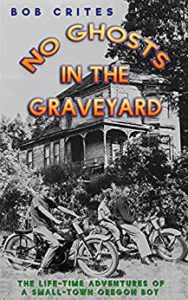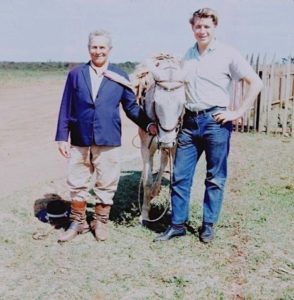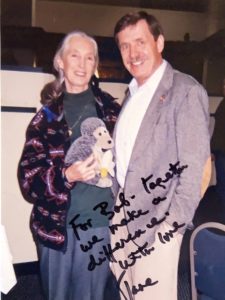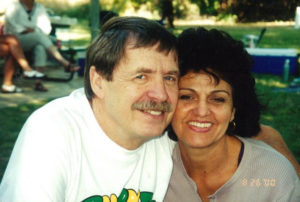No Ghosts in the Graveyard by Bob Crites (Brazil)
 No Ghosts in the Graveyard: The
No Ghosts in the Graveyard: The
Life-Time Adventures of A Small-
Town Oregon Boy
by Bob Crites (Brazil 1964-66)
Independently Published 2021
428 pages
$12.99 (Paperback)
When Bob Crites was in the seventh grade in Drain, his social studies teacher Art Biederman showed the class pictures of his summer travels. It sparked what would become a lifelong passion for helping children in other countries.
Crites would grow up to help feed school lunches to children in Brazil, form a charity to provide scholarships for children in Brazil and Tanzania, and bring one young athlete to Oregon, where she trained for the Olympics.
Crites recently self-published his memoirs, “No Ghosts in the Graveyard: The Life-Time Adventures of a Small-Town Oregon Boy” on Amazon.
Crites was born in 1940 in Drain on a farm that had been in his family since his maternal great grandfather Augustus Hickethier founded it in 1877. A brother and sister, Richard and Bonita, were also born at the same time. The trio were the first triplets known to have been born in Douglas County, Bob Crites said.
The Crites family would bounce back and forth between Drain and Lane County throughout much of Bob Crites’ childhood, but he graduated from high school in Drain in 1959, later going on to become a school counselor and settle in Eugene, Oregan.
His first foray into the wider world began when he joined the Peace Corps in 1964 with his first wife Janet.
“I never let go of that idea of wanting to travel and wanting to see other parts of the world,” he said.
But he had little money and no desire to see the world through the eyes of a soldier.
The newly formed Peace Corps was his opportunity, and he took it.
The couple was sent to Brazil.
“I have never had an experience as exciting, as scintillating, as just absolutely positively overwhelming in a positive way as when we first landed in Brazil and stepped onto Brazilian soil and realized we were in a foreign country,” he said.
Crites was sent first to work in a public health program where his attempts to install outhouses were met with skepticism and later, and more successfully, to start a school lunch program in Espirito Santo.
The United States had a lot of surplus food to share at that time and the Peace Corps volunteers would go out into the community and find and organize volunteers to store the food and cook the lunches.
“I really found that sort of work resonates with me. It was empowering to me and it made me feel like I had something to contribute. I could make a difference, and that’s a really good feeling,” he said.
As a school counselor at Briggs Middle School in Springfield, he helped school kids in Springfield raise money to build schools in Paraguay, Costa Rica and El Salvador.
Through his involvement with the Peace Corps, he was able to assist Mozambican Olympic athlete Maria Mutola in 1991.
Mutola had a scholarship grant from the Olympic Solidarity Committee but she was in need of American training and an education. She had only a sixth-grade education, but she wanted to train in Eugene.
Crites arranged for Mutola to attend Springfield High School. Eventually, she went on to get her education. She also went on to specialize in the 800-meter race, compete at six Olympic Games, become a three-time world champion and win Olympic gold and bronze medals.
In 1997, Crites read an article on an inflight magazine about an upper-class woman in Rio De Janeiro who worked with street kids in the slums.
He met her the day after Christmas and she took him to one of the slums.
Shortly afterward, in 1997, Crites started a nonprofit called Students Helping Street Kids International, or SHSKI. Through it, school children in America raised funds to provide scholarships to needy students in Latin America, allowing them to attend the private schools that provided them their best chance at passing college entrance exams.
Three of the students were so talented they were brought to the United States. One of these, piano prodigy Priscilla Almeida Dantas, received scholarships until she graduated from the University of Oregon with a degree in music.
In 1998, while exhibiting SHSKI at an Oregon Youth Summit in Wilsonville, he met primatologist Jane Goodall.
After looking at his exhibit, Goodall “looked at me with that gentle way and that gentle smile and said would you do this for me in Tanzania. I said you bet I would.”
So SHSKI partnered with the Jane Goodall Institute to provide scholarships to Tanzanian students.
While Crites had achieved success in his nonprofit endeavors, he had been through more than one divorce. He longed for a wife.
Love would find him through a little intervention from friends Merval Jurema Filho and Ana Cristina Loureiro Jurema, a Brazilian couple living in Eugene.
Crites had turned to a matchmaking service and was trading letters with women through it. But his friends suggested he meet their aunt.
Dalva lived in Brazil, but she was the perfect match, and the two have been married for 20 years. Not a day goes by, he said, that they don’t say they love each other and they hold hands wherever they go.
“It’s the best thing that’s ever happened to the two of us. It really is wonderful,” he said.




I look forward to reading Bob’s memoir. I had the good fortune of getting to know Bob and Dalva in the early 2000’s. Thanks to Bob, the Oregon University System’s IE3 Global Graduates program placed a number of Oregon college student interns into SHSKI and related street kids programs in Recife–experiences that deeply impacted their lives. Having been raised in a small rural town in Oregon myself, and also been drawn to the Peace Corps in the late sixties, this will be a specially meaningful read. Thanks for putting your many experiences to paper, Bob.